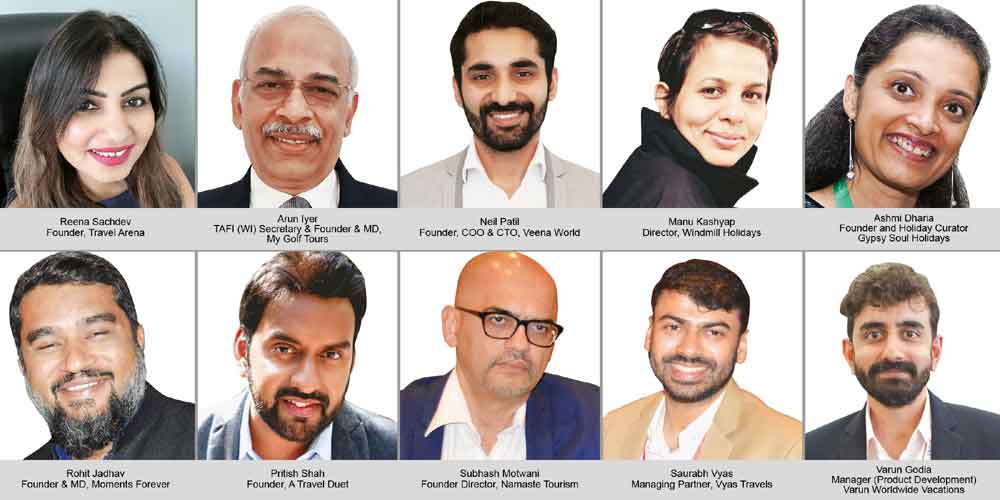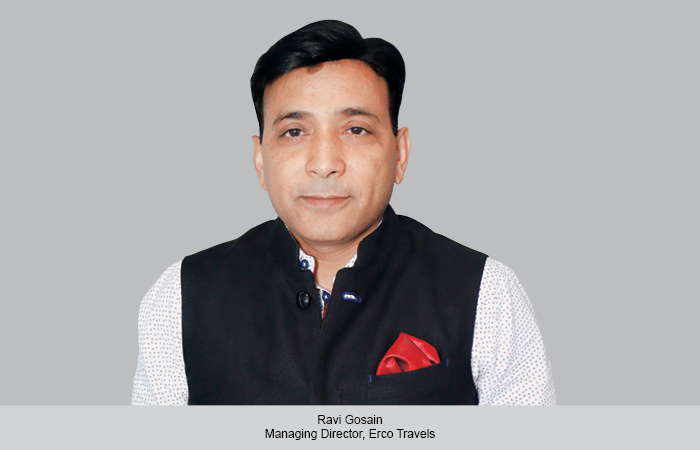The recent abatement to service tax from 4.5 per cent to 9 per cent on tour operators has come as a big blow to the travel trade. While the CENVAT credit could be a boon for inbound operators, it might negatively impact the outbound business. Industry experts share their views with TRAVTALK
Expert View
Bipin Sapra Partner, Tax & Regulatory ServicesIndirect Tax, Ernst & Young
Previous notification
- 10 per cent abatement if only hotel is booked which means1.5 per cent net tax
- 70 Percent abatement if a packaged tour is booked Inclusive of travel hotel and sightseeing, which means tax is being paid at 30 per cent. This would mean 4.5 per cent net tax
New notification
- Starting Jan 22, 2017, the government has merged both the earlier abatements and have come out with an abatement rate of 40 per cent
- Effectively 60 percent of the services get taxed and the net tax rate becomes 9 per cent
- Credit of input services has been allowed
Effect on outbound tour operators
If a tour operator books a hotel in Germany worth Rs. 10,000 per night, with the earlier service tax being paid at 1.5 per cent (Rs. 150), the price of the hotel would come around Rs. 10,150.
With the new abatement notification, service tax at 4.5 per cent (Rs 900), the total value the customer will be paying to the tour operator would be Rs 10,900 — six times higher than earlier. For packaged tour worth Rs. 20,000, which includes hotel and sightseeing, worth Rs. 10,000 each, the tax earlier would have been Rs. 600, but now it will be Rs. 1200, which is almost double. This is a case of undue hardship for outbound tour operators, as for them, there is no cost which is lying in the country, and most of the cost lies outside India. With the new abatement, they cannot get a credit of the taxes that have been paid outside the country, which in turn will create an anomaly.
Effect on inbound and domestic tourism
If travel happens locally in India and the service tax is being paid on that, then the tour operator can take credit of that at the margin and pay final service tax. Thus, for inbound and domestic tour operators, the credit which was missing earlier has now been included.
Solution
Government should realise that the travel and tour industry in India is diverse. The government should give an option to the tour operators that if they want to pay tax and take credit, they can use the abatement and if taking credit is not advantageous, they can go back to the earlier notification and effectively pay the tax at the earlier rate.
Trade View
Guldeep Singh Sahni, DDP Trailblazer, India Travel Awards 2016, and President, OTOAI
With this move, the tax for us is going to increase from 4.5 per cent to almost 9 per cent. The move will directly affect offline tour operators within India and it will be beneficial for those who take bookings outside the country, as they won’t come under any such laws. Over 20 million people from India are travelling outside the country and the outbound travel industry is creating so many jobs. Taxing this sector would only affect the tour operator businesses in India and would allow anybody to operate the same business for Indians outside the country. It’s an unjust tax and would kill the tourism industry in India.
Pronab Sarkar, President, IATO
Firstly, we are somewhere losing out on air tickets as here CENVAT credit return is not much. Another issue is that of medical tourism, as no service charge is levied on any services under it. Thus, if we charge it will be a loss proposition as the clients will go directly to the hotels, as they are under hospital registrations. Thirdly, outbound tours will also get affected because all outbound tours are being charged. We know that taxes cannot be exported, hence the place of provision has to be seen, and we have to request the government to abolish those charges and outbound tour operators should be liable to pay only on the commission earned or the profit they are making. We are going to take these three issues to the government and we are going to discuss the matter before we finalise the document. We are not against paying taxes. On the lines of GST, they are giving us CENVAT credit, which is a good thing but working of this new rule will be a cumbersome issue, as we have to obtain the bills and deposit with the claim forms and original bills, which we usually don’t get.
Jay Bhatia, Entrepreneur of the Year, India Travel Awards 2014, Hon. National Treasurer, TAAI
The central government has amended the abatement percentage for a tour operator effective January 22, 2017. Although the effective rate of tax for a tour operator has increased, the government has removed restrictions on claiming CENVAT credit of the input services. Now the input credit for all eligible services can be claimed. However, the hotels don’t give a break cost and the competition faced from OTAs still shall persist as regards to a tour operator. The government is losing a lot of service tax as well as the loss in terms of foreign exchange going out when travellers book through the OTAs. The Indian tour operators have lost all ground to compete with global OTAs who are promoting and selling online.
Sarab Jit Singh, Tourism Ambassador, India Travel Awards 2016, and Vice Chairman, FAITH
I feel that this ruling is part of the government’s move towards GST. Such measures would force people to do business legitimately. We are getting conflicting views and interpretations from different CAs and lawyers. Barring a few services for the tour operators’ business, selling air tickets should not have been made part of the new service tax regime. There are certain items which should be taken out of the purview of service tax, like domestic air tickets, because if customers buy tickets directly from airlines, the service tax is 0.75 per cent and if they buy from tour operators it is 9 per cent. Similarly, for outbound tour operators, there will now be nine per cent service tax and CENVAT credit will be zero, as services are being provided outside India. Due to this people will start booking outside India through agencies and OTAs.
P.P. Khanna, President, ADTOI
With this announcement, the government is preparing us for the Goods and Services Tax (GST). There is already a big load on tour operators as we are competing with OTAs. We know that tour operators are a bit costlier, because they pay service tax, which is not the case with OTAs. Now, with the new tax regime it would be another blow to our businesses. We only survive on relationships we build with our customers and their loyalty. However, with more price hikes, we would lose out on our business. On one hand, the government wants to increase employment and revenue in tourism, on the other hand, it is heavily taxing the tour operators.
Riaz Munshi, Vice President, OTOAI
This is a negative and an unfortunate move for the tourism and hospitality industry. The increase in service tax is almost 9 per cent and a deterrent to our business as it reduces the competitiveness of our packages. The government has to understand that the products sold are available globally and an Indian traveller might as well buy a package for Singapore from a travel agency based in Singapore rather than pay 9 per cent extra tax to an Indian travel agency. The travel agencies based abroad do not need to pay this service tax and thus can sell packages at a much cheaper rate than us. We as OTOAI have put forward our concerns to the government.
Ashish Gupta, Consulting CEO, FAITH
The earlier category of tour operators has now been merged into one category. Effectively, for inbound and domestic, if you are in a position to take invoices as has been mentioned under the abatement, then all the service tax which is applicable on the invoice will be available as credit, which means earlier the service tax on which one used to charge service tax of 4.5 per cent will now not be the base for their costing calculations. That will not be a pass through, but will be a set, which means your effective service tax incidence, while the service tax rating goes up, the effective service tax should go down. However, outbound is where this becomes uncompetitive. We have been in all the discussions on the FAITH platform with the concerned departments, and we have asked them to look at the place of provision of service.
Lally Matthews, Hon. Secretary IATO
If one takes a closer look at the notification, since we are getting CENVAT on hotel and transportation, it could actually be beneficial for the tour operators. This means that for tour operators, if proper accounting is done, and CENVAT is taken from the hotel and the transporters, it is actually be beneficial for the tour operators. Getting CENVAT is not going to be difficult as far as your documentation is in order. The invoice or bill has to have the name of the company, service tax number, and the service tax the vendor or hotel has charged. However, outbound may have a little problem with this issue.
Rajan Sehgal, Chairman-Northern Region, TAAI
Post demonetisation, the travel industry has already lost out on a lot of business with inbound and domestic tourism witnessing a decline. The times have already become tough for the industry and with the announcement of the tax on tour packages, things are only going to get worse. This is probably the only industry with no structured income and often, non-IATA agents or agents who have not been recognised by the Ministry of Tourism are earning more than the verified ones. Such decisions are discouraging more agents to get recognised by the tourism bodies since they are getting more returns without it. Here we discuss about how taxes need to be lowered to boost tourism, but it looks like the opposite is happening.
Ankush Nijhawan, DDP Face of the Future, India Travel Awards 2014 and MD, Nijhawan Group
I think this increase in service tax is just the trailer for GST to set in. The government has made a soft opening to what GST will have in store at 14-18 per cent. Given this move, the tourism and hospitality industry has to brace itself for high tax rate when GST will be implemented. The prices will shoot up in short term and the effect will be seen on outbound as well as domestic travel. The increase in prices of holidays sold as packages will result in travellers paying more and the business will be impacted temporarily. However, we need to wait for what GST has in store when it is implemented in June this year.
Kapil Berera, Treasurer, OTOAI
One thing is clear that the service tax regime is here to stay, and anybody who is not accepting it is going to have a problem. We agree that books and documents will have to be maintained, but what is worrisome is that for outbound tour operators, there is no relief. No company is going to survive on a 9 per cent service tax model because we will get very uncompetitive. A lot of agents would start booking directly form the customers and have a service free model out here. OTOAI is under a very serious discussion with a lot of lawyers, Chartered Accountants and senior consultants to look for solutions. We believe that a very concise legal action has to be taken.
Sandeep Jain, Joint Secretary, IATO
Putting in place such a service tax in the midst of the season, when the businesses are already low, is absolutely unacceptable and we will fight it out. It is practically impossible for us to pay the additional service tax, wherein we have confirmed bookings. We can’t even ask the FTOs or the guests to pay the additional amount at this time. I feel the trade should have been given sufficient time to cover up for the service tax. It is disheartening to see that when we are in the middle of the season, we are only trying to come out of new policies and that too in 4-5 days’ notice.
Jyoti Kapur, Immediate Past President, ADTOI
The new service tax is going to directly affect the consumers, as well as the travel providers since the costs are going to get higher. The service tax might not have a dire effect on the hotels but the travel agents are going to suffer immensely, especially when we have been trying to recuperate post demonetisation. Inbound and domestic tourism are most likely to face a slump once the directive is applied. However, this move seems unnecessary as the Union Budget is to be announced soon anyway. By increasing the cost of travel, the tax is only creating a non-feasible environment for any kind of growth for the tourism industry.
Lajpat Rai, Director, Lotus Trans Travels and Lotus and Lotus Nikko hotels
As a tour operator I feel that now we have to pay maximum of our income in taxation, as we earn maximum 10 per cent because of competition. Tourism has declined this year. If I ask my agent to pay me nine per cent, he would stop selling India. The billing, which we have already done has costed us our own money. From next contract, we have to charge the FTOs, and not a single one has agreed to pay. Whatever business I have sourced from Japan, I can’t charge any money from them in taxation, and that is the biggest problem for me. The government should have given us some time or announced it in the budget, so that we could have given time to our FTOs regarding the same. Announcing today and charging from tomorrow is not possible anywhere in the world.
Arun Verma, Director, Allways Travel Services
In domestic and inbound, we work on credit as we need to pay first and get our bills later. Thus, by the time we pay and get the bills two months down the line, we may or may not be able to avail of the CENVAT credit. Secondly, in outbound, where there is no CENVAT credit available, nobody is going to buy a package from us on a 9 per cent margin, and will book directly with hoteliers and tour operators outside India. Since we do all three, we will have to do a lot of juggling for our accounts. The government should increase the exemption limit for people like us doing small business to around `10-20 crores and redefine that value as per inflation, which has risen over the past so many years.
Mahesh Iyer, Chief Operating Officer, Thomas Cook (India)
The impact of the new service tax is two-fold — a resultant doubling of the tax rate on the sector, and given that implementation is within a week, reaction time as well as time for advocacy is negligible. This will impact outbound tours as the effective tax rate moves from 4.5 per cent to 9 per cent as no input credit is available for indirect taxes incurred outside India. Ability to claim credits on input services may not be proportionate to the increased taxes, thereby impacting price to consumers. Hotels through tour operators may get impacted with the removal of the 1.5 per cent effective rate to tax margins – now, entire accommodation is to be taxed, with input credits. Passing of such credits may be a challenge as the hotel sector is largely unorganised.
Harjinder Singh, Director, 24X7travel.com
It is going to be very difficult for small and medium sized tour companies to handle these kind of taxes. One needs a special team to handle the CENVAT credits in case you are doing inbound or domestic tours. Outbound operators are absolutely on a back foot. International companies, which have offices outside India, will have a huge advantage, as they would be much cheaper than the local tour operators in India. It is very easy to market to the masses in India today, thanks to globalisation and the Internet that these companies can reach the masses and are much cheaper. The local operator will lose the business and there will be job cuts. We will see a lot of Indian companies changing the business modules.
Abhay Jaipuria, Director, Travel Oytser
It’s not a level playing field for outbound tour operators. According to the service tax laws, the point of provision of tax, if it’s in non-taxable zone, should not be taxed. However, they have another point that if the citizen is Indian, it has to be taxed. All the guests cannot go to the DMC outside, but they can go to the online booking systems. Thus, we should open offices outside and do billing from there. Out of 10 per cent margin, most of the time I give my sub agent a 3 per cent cut, and then he further discounts 3 per cent and at least a 4 per cent discount to the guest. Three agents are sharing the margins. Thus, on those margins, 9 per cent is over and above the actual international price.
Siddharth Jain, Founder Director, Click2Travel.com
Government has taken a wrong decision by introducing it in the middle of the peak season for the industry. They haven’t understood that there is an implementation cost, which the agents and the tour operators have to bear to implement these systems. Tour operators need to unite and need to educate the Ministry and the concerned departments that this is not the right time to roll out the changes. As far as outbound is concerned, the government needs to understand that it is not a level playing field and whatever business the tour operators are doing right now, the entire revenue will automatically would go abroad, sooner or later.
Brijesh Modi, Head-Finance & Commercial, SOTC Travel
On holiday packages, specially bundled services, due to the changes in the taxable services from 30 per cent to 60 per cent, the effective service tax rate will see an increase from 4.5 per cent to 9 per cent. On hotel accommodation services provided by travel agents, the current rate of service tax is 1.5 per cent and is expected to increase and we are seeking the clarification on the same. On transport services provided by travel agents, the current service tax rate will remain at six per cent. Above change in service tax will increase the selling prices of holiday packages.
Kapil Goswamy, CEO and Managing Director, BigBreaks.com, India Travel Award winner
Travel industry today is a highly taxed sector in the Indian economy, a fact that makes it less competitive and relatively less attractive to foreign travellers. To make things worse, the government recently announced an increase in service tax on tours/holiday packages from 4.5 per cent to 9 per cent. India’s travel and tourism industry is a dynamic one. From the perspective of Indian travellers, today, there is a change in the traditional segment, from the usual domestic destinations to outbound travel — Dubai, Thailand, Malaysia, Bangkok, Europe, indeed, the entire world. From the government we expect rollback of the service tax introduced recently on holiday packages, bring measures to improve liquidity in the system severally affected by demonetisation, tax reforms and reducing tax and investment in improving road infrastructure.
 TravTalk India Online Magazine
TravTalk India Online Magazine





